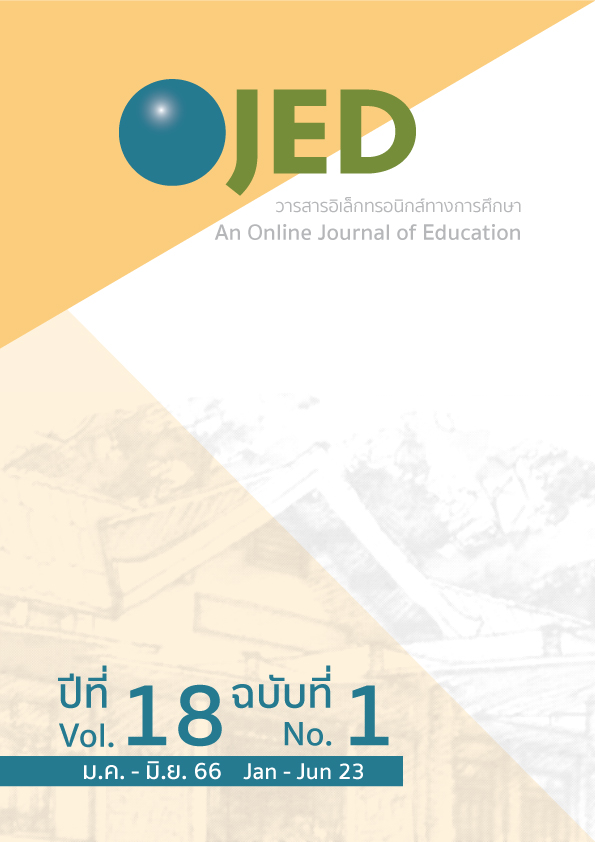Reciprocal Teaching: An Instructional Strategy to Enhance English Reading Comprehension of Secondary School Students
DOI:
https://doi.org/10.14456/ojed.2023.7Keywords:
reciprocal teaching, reading strategies, English reading comprehension, perceptionsAbstract
Reciprocal Teaching has become an instructional strategy to enhance English reading comprehension for Thai secondary school students. Forty students participated in this mixed-methods study for ten weeks. The study compared students’ English reading comprehension in Reciprocal Teaching with those students in pre, while, and post-Reading Instruction. It also explored students’ perceptions of Reciprocal Teaching strategies. The research instruments included (1) an English reading comprehension test; (2) a Reciprocal Teaching questionnaire, and (3) a Semi-structured interview. Quantitative data from a paired samples t-test indicated that students in the Reciprocal Teaching significantly improved their English reading comprehension at a level of 0.05. The qualitative data showed positive perceptions toward Reciprocal Teaching strategies, including predicting, clarifying, questioning, and summarizing. This study led to the application of Reciprocal Teaching to support students reading English in a foreign language.
References
Cohen, J. (1988). Statistical power analysis for the behavioral sciences (2nd ed.). Routledge. https://doi.org/https://doi.org/10.4324/9780203771587
Dabarera, C., Renandya, W. A., & Zhang, L. J. (2014). The impact of metacognitive scaffolding and monitoring on reading comprehension. System, 42, 462-473.https://doi.org/https://doi.org/10.1016/ j.system.2013.12.020
Diana, O., & Dina, F. (2016). Developing students' reading comprehension skill through reciprocal teaching strategy: Advances in social science, education and humanities research. Proceedings of the Ninth International Conference on Applied Linguistics (CONAPLIN 9), 82(5), 22-27. https://doi.org/10. 2991/conaplin-16.2017.5
Education First (EF). (2021). EF English proficiency index. https://www.ef.co.th/epi/regions/asia/thailand/
Fry, E. (1968). A readability formula that saves time. Journal of Reading, 11(7), 513-578. http://www.jstor.org.chula.idm.oclc.org/stable/40013635
Grabe, W. (2017). L2 reading comprehension and development. In E. Hinkel (Ed.), Handbook of research in second language teaching and learning (pp. 299). Routledge.
Grabe, W., & Jiang, X. (2018). First language and second language reading. In E. Hinkel (Ed.), The TESOL encyclopedia of English language teaching (pp. 1-7). Routledge.
Grabe, W., & Stoller, F. L. (2019). Teaching and researching reading (3rd ed.). Routledge. https://doi.org/ 10.4324/ 9781315726274
Harvey, S., & Goudvis, A. (2017). Strategies that work: Teaching comprehension for engagement, understanding, and building knowledge, grades K-8 (3rd ed.). Stenhouse.
Huang, C.-T., & Yang, S. C. (2015). Effects of online reciprocal teaching on reading strategies, comprehension, self-efficacy, and motivation. Journal of Educational Computing Research, 52(3), 381-407. https://doi.org/10.1177/0735633115571924
Izadi, M., & Nowrouzi, H. (2016). Reciprocal teaching and emotional intelligence: A study of Iranian EFL learners' reading comprehension. The Reading Matrix : an International Online Journal, 16, 133-147. http://www.readingmatrix.com/files/14-97wj1wl6.pdf
McLaren, S. R. (2018). Effects of reciprocal teaching in guided reading with third grade students with specific poor comprehension. [Master’s thesis, Rowan University]. Rowan Digital Works. https://rdw.rowan.edu/etd/2595
Navaie, L. A. (2018). The Effects of Reciprocal Teaching on Reading Comprehension of Iranian EFL Learners. Advances in Language and Literary Studies, 9(4), 26. https://doi.org/10.7575/aiac. alls.v.9n.4p.26
Oczkus, L. D. (2018). Reciprocal teaching at work: Powerful strategies and lessons for improving reading comprehension (3rd ed.). ASCD.
Office of the Basic Education Commission. (2008). Basic education core curriculum B.E. 2551 (A.D. 2008). Bangkok: Ministry of Education
Okkinga, M., van Steensel, R., van Gelderen, A. J. S., & Sleegers, P. J. C. (2018). Effects of reciprocal teaching on reading comprehension of low-achieving adolescents. The importance of specific teacher skills. Journal of Research in Reading, 41(1), 20-41. https://doi.org/https://doi.org/10.1111/1467- 9817.12082
Palincsar, A. S. (2013). Reciprocal teaching. In J. Hattie & E. M. Anderma (Eds.), International guide to student achievement (pp. 369-371). Routledge.
Palincsar, A. S., & Brown, A. L. (1984). Reciprocal teaching of comprehension-fostering and comprehension-monitoring activities. Cognition and Instruction, 1(2), 117-175. http://www.jstor.org.chula.idm.oclc.org/stable/3233567
Par, L. (2020). The relationship between reading strategies and reading achievement of the EFL students. International Journal of Instruction, 13(2), 223-238. https://doi.org/10.29333/iji.2020.13216a
Saddler, B., Asaro-Saddler, K., Moeyaert, M., & Cuccio-Slichko, J. (2019). Teaching Summary Writing to Students with Learning Disabilities via Strategy Instruction. Reading & Writing Quarterly, 35(6), 572– 586. https://doi.org/10.1080/10573569.2019.1600085
Susar, F., & Akkaya, N. (2009). University students for using the summarizing strategies. Procedia - Social and Behavioral Sciences, 1(1), 2496-2499. https://doi.org/https://doi.org/10.1016/j.sbspro. 2009.01.440
Thongwichit, N. (2018) Reading in English: what problems do students face in the South of Thailand?. Humanities, Arts and Social Sciences Studies, 18(1), 75-89. https://doi.org/10.14456/hasss.2018.6
Tolongtong, N., & Adunyarittigun, D. (2020). The reciprocal teaching procedure: An alternative reading instruction that works. Journal of Studies in the English Language, 15(2), 27-62. https://so04.tci- thaijo.org/index.php/jsel/article/view/239870
Downloads
Published
How to Cite
Issue
Section
License
Copyright (c) 2023 An Online Journal of Education

This work is licensed under a Creative Commons Attribution-NonCommercial-NoDerivatives 4.0 International License.




